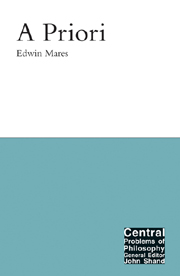5 - Analyticity
from Part II
Summary
Analytic-synthetic distinctions
Consider the following sentences:
(i) A vixen is a female fox.
(ii) The cat is on a mat.
The first of these is a paradigm analytic sentence and the second is a paradigm synthetic sentence. Sentence (i) seems to be made true by facts about language or about our concepts, but sentence (ii) is made true largely because of something about the world.
There are many ways to make these notions of analytic and synthetic precise. A full map of the different conceptions of analytic and synthetic, unfortunately, would be an unintelligible mess. Even giving a guide to the most influential concepts, as I try to do in this chapter, may overwhelm the reader with distinctions. I thus advise caution and care on the part of the reader when approaching it.
Having said that, there are three main versions of the analytic–synthetic distinction. The first of these employs metaphysical conceptions of analyticity. Metaphysical conceptions of analyticity hold that an analytic sentence is made true by the meaning of the words in it and the way in which they are arranged. A synthetic sentence on metaphysical theories, if true, is made true by virtue of something other than the meanings of the words involved in it or their arrangement. The second distinction employs epistemological conceptions of analyticity. According to epistemological notions, a sentence is analytic if and only if understanding it is sufficient to justify the claim that it is true.
- Type
- Chapter
- Information
- A Priori , pp. 66 - 82Publisher: Acumen PublishingPrint publication year: 2011



